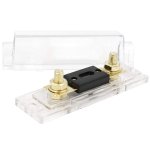gslabbert5119
Well-known member
Thoughts on this ...
Do I have something shorting or do I have the incorrect fuse type, or is there another reason that you guys can come up with.
My wife uses the microwave 1500watts and the kettle 1500watts at the same time and it immediately blows the 400amp ANL fuse (happened twice in 2 days) that protects the Inverter charger. The inverter charger is a 3000w that should be able to handle a surge of up to 9000w
My little electrical knowledge tells me that 3000w at 120v = 25amps
I do not find a short, and both appliances work just fine independently and neither 15 breaker that supplies kettle curciot or the 20 amp breaker that supplies the microwave trips
Inverter specs below ...
Thoughts ideas and suggestions are most welcome.
Inverter Output Specifications:
Input Specifications:
Charger Specifications:
Do I have something shorting or do I have the incorrect fuse type, or is there another reason that you guys can come up with.
My wife uses the microwave 1500watts and the kettle 1500watts at the same time and it immediately blows the 400amp ANL fuse (happened twice in 2 days) that protects the Inverter charger. The inverter charger is a 3000w that should be able to handle a surge of up to 9000w
My little electrical knowledge tells me that 3000w at 120v = 25amps
I do not find a short, and both appliances work just fine independently and neither 15 breaker that supplies kettle curciot or the 20 amp breaker that supplies the microwave trips
Inverter specs below ...
Thoughts ideas and suggestions are most welcome.
Inverter Output Specifications:
- Listed to UL 458 Standards
- Continuous Output Power: 3000 Watts
- Surge Rating: 9000 Watts (20 Seconds)
- Output Waveform: Pure Sine/Same as input (Bypass Mode)
- Output Voltage: 100-110-120Vac
- Nominal Efficiency: >92% (Peak)
- Line Mode Efficiency: >95%
- Output Frequency: 50Hz +/- 0.3Hz / 60Hz +/- 0.3Hz
- Bypass Terminal Breaker - 40 amps
[*]Typical Transfer Time: 10ms (Max)
[*]THD: < 10% DC
Input Specifications:
- Nominal Input Voltage: 12.0Vdc
- Minimum Start Voltage: 10.0Vdc
- Low Battery Alarm: 10.5Vdc-11.0Vdc
- Low battery Trip: 10.0Vdc-10.5Vdc
- High Voltage Alarm: 16.0Vdc
- Low Battery Voltage Restart: 13.0Vdc
- Idle Consumption: 55 Watts
- Charger breaker - 30 amps
[*]Power Saver Mode Idle Consumption:21.7 Watts
Charger Specifications:
- Output voltage: Depends on battery Type
- Charger Rate: 100A

